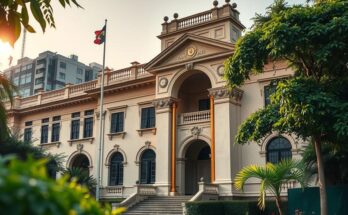Starbucks is investing in two new coffee farms in Central America to protect its supply chain against climate change. The company aims to study hybrid coffee varieties in varying conditions, addressing the challenges posed by extreme weather that has significantly impacted coffee production globally. This initiative aligns with Starbucks’ ongoing commitment to sustainability and innovation in coffee cultivation.
Starbucks has announced a significant investment in two new farms located in Central America to combat the adverse effects of climate change on its coffee supply. As a company that sources approximately 3% of the global coffee supply, Starbucks is increasingly encountering challenges due to extreme weather conditions, which have adversely affected coffee production across the globe. The new farms, one of which is in Costa Rica and the other in Guatemala, will serve as research centers to evaluate the performance of hybrid coffee varieties under varying elevations and soil conditions. This initiative builds on Starbucks’ earlier investment in a coffee farm in Costa Rica over a decade ago. The coffee industry has been facing unprecedented challenges, including rising temperatures and severe frosts in Brazil, compounded by the ongoing effects of La Niña. These issues can drastically decrease coffee yields, as highlighted by Roberto Vega, the Vice President of Global Coffee Agronomy at Starbucks, who stated, “Frosts in Brazil have already impacted volumes of up to 50%, so we can have really severe impact in terms of product availability, and that is more and more regular in the whole Coffee Belt.” At these innovation farms, the company aims to develop coffee hybrids that boast traits such as enhanced productivity and resilience to coffee leaf rust, a fungus exacerbated by warmer and wetter climates. Vega emphasized, “We can develop new hybrids, but the fact that a hybrid works in one country and under certain conditions doesn’t mean that it’s going to be working everywhere.” In addition to focusing on climate resilience, Starbucks plans to address broader agricultural challenges faced by coffee farmers. The Guatemalan farm, which presents significant barriers due to its depleted soil and low productivity, is viewed as an opportunity to innovate recovery methods that can be imparted to other farmers in the region. Vega noted, “The farm is not necessarily in good shape, and that’s exactly what we were looking for. We wanted a farm that really mirrors the challenges that farmers are having today.” Furthermore, the Costa Rican farm, situated adjacent to Starbucks’ existing property, Hacienda Alsacia, will incorporate advanced technologies such as drones and mechanization. This strategic move aims to alleviate labor shortages prevalent among many coffee farmers in Latin America. Looking ahead, Starbucks is planning to expand its agricultural initiatives further with the intention of acquiring two additional farms in Africa and Asia, thereby enhancing its agricultural footprint across the Coffee Belt.
Starbucks is taking proactive steps to safeguard its coffee supply as climate conditions deteriorate globally. The company’s reliance on Arabica beans, which are particularly sensitive to climate change, has prompted this strategic investment in farms designed to develop innovative coffee varieties. The decision reflects an understanding of the growing pressures caused by climate phenomena like La Niña, which have resulted in significant declines in coffee production, particularly in key regions like Brazil. Understanding the environmental factors influencing coffee cultivation is critical for the company’s long-term sustainability and growth in the coffee market.
In summary, Starbucks is making concerted efforts to mitigate the impacts of climate change on its coffee supply through investments in innovation farms in Central America. By experimenting with hybrid coffee varieties and addressing systemic agricultural challenges, the company aims to secure a sustainable future for coffee production. This initiative not only reflects a commitment to environmental stewardship but also an awareness of the operational challenges faced by coffee farmers in a changing climate.
Original Source: www.cnbc.com




